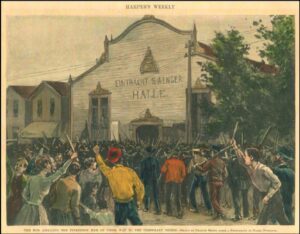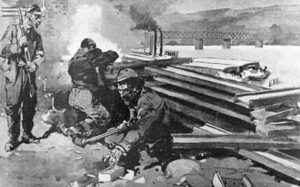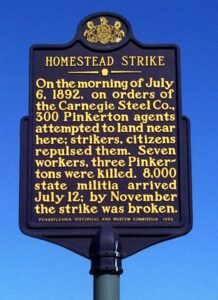ABOUT THE BATTLE OF HOMESTEAD FOUNDATION
The Battle of Homestead Foundation (BHF) is a diverse organization of citizens, workers, educators and historians. Our purpose is to memorialize the dramatic labor conflict of the 1892 Battle of Homestead and clarify the consequences that remain with us today. Inspired by that event, we promote a people’s history, empower today’s workforce and build strategies for the future of work. The Foundation is a 501(c)(3) tax-exempt nonprofit organization.
Origins
 The idea for the Battle of Homestead Foundation began in 1989 with breakfast meetings in Swissvale between Russ Gibbons, Charles McCollester, Steffi Domike and Dave Demarest. They were soon joined by other individuals with interest in labor history; early group projects included producing videos (Building Pittsburgh and Out of this Furnace) and the Labor’s Corner radio program at WQEX.
The idea for the Battle of Homestead Foundation began in 1989 with breakfast meetings in Swissvale between Russ Gibbons, Charles McCollester, Steffi Domike and Dave Demarest. They were soon joined by other individuals with interest in labor history; early group projects included producing videos (Building Pittsburgh and Out of this Furnace) and the Labor’s Corner radio program at WQEX.
The group was united in a desire to appropriately commemorate the centennial of the Homestead Strike that occurred in July, 1892, when Carnegie Steel Corporation hired private para-military operatives to attack its mill employees and end the nascent steelworker union.
What became known as The Battle of Homestead drew international attention and outrage from the contemporary press and remains to this day a milestone event in the forward march of the emerging U.S. labor movement.
In 1990 the Homestead Strike Centennial Commemorative Committee was formed with Russ Gibbons as chair. McCollester and Gibbons were invited by Park Corporation to participate in discussions about the future of the Pump House during the demolition of the former Homestead Steel Mill complex. The group vigorously and successfully protested the planned designation of the site as “Pinkerton Landing”, advancing instead the name of “Battle of Homestead”.
Today the site is owned and benevolently operated by Rivers of Steel Heritage Corporation, who also offer many educational programs, tours, and events related to the Pump House as well as other local points of interest.
Mission
The July 6, 1992 Centennial of the Battle of Homestead was the occasion for a major conference at Homestead Carnegie Library spearheaded by Gibbons with support from Community College of Allegheny County, the United Steelworkers and Indiana University-Pennsylvania’s Labor Center. Speakers included Lynn Williams, Paul Kraus and Bill Serrin.
In the two preceding years, Dave Demarest and Fania Weingartner from University of Pittsburgh Press had organized a collective of a dozen people that edited a book of primary source material on the battle entitled The River Ran Red: Homestead, 1892; Steffi Domike and Nicole Fauteaux produced an hour-long documentary video of the same name.
Three state historical markers were proposed by Gibbons and McCollester and dedicated in 1992 as part of the centennial: The Battle of Homestead marker at the Pump House, Homestead Cemetery grave sites, the Bost Building that served as union headquarters during the 1892 strike.
In the months after the centennial celebration, the informal Wednesday breakfast group (titling itself “the Pump House Gang”) grew to include Mike Stout, Joel Sabadasz, Bill Yund, Norm Koehler, Joel Woller, Joe White, Jim Hohman and Rosemary Trump with visits from advisors Clarke Thomas, John Hoerr, Bill Serrin, Paul Laxton, Thorsten Gresser and Bette McDevitt. A more permanent organization soon evolved that began producing a half-dozen lecture and film programs a year that reached ever-larger audiences interested in the region’s labor heritage.
In 1994, the Pump House Gang parterned with the Pennsylvania Labor History Society to co-sponsor the 75th anniversary of the 1919 Homestead Steel Strike and death of Pittsburgh labor organizer Fannie Sellins. The group also co-sponsored the 1909 McKee’s Rocks Strike Centennial and the 1914 Westinghouse Strike Centennial programs.
Incorporation
 The Battle of Homestead Foundation formally incorporated as a nonprofit corporation in February, 1997, in time for September’s national AFL-CIO convention in Pittsburgh that included an early morning visit to the battle site by AFL-CIO President John Sweeney complete with color guard and bagpipes.
The Battle of Homestead Foundation formally incorporated as a nonprofit corporation in February, 1997, in time for September’s national AFL-CIO convention in Pittsburgh that included an early morning visit to the battle site by AFL-CIO President John Sweeney complete with color guard and bagpipes.
The BHF also served as the Western PA wing of the Pennsylvania Labor History Society. Mike Healey was pro bono attorney during our early history, but in the late 1990s, Bernie Kleiman, General Counsel of the USW, became increasingly involved in our negotiations with the Steel Industry Heritage Corporation, which led to a memorandum of agreement recognizing the Foundation as labor’s representative for education and programming at the site.
The Foundation received a $10,000 grant from the Pennsylvania Department of Community & Economic Development matched by a campaign for labor donations and support from Indiana University-Pennsylvania Labor Center.
These fundraising efforts allowed for the commissioning of Bill Yund’s dramatic Pump House window banners marking the decades of steel workers at the site, along with the casting of the large bronze external marker with the Homestead worker’s statement concerning the 1892 strike and the model of the mill site as it existed in 1892 (presently residing at the USW Pittsburgh headquarters). A subsequent IUP Labor Center grant allowed for the purchase of projector, screen and DVD/VHS player for educational programs.
New century, new projects
In 2008, the Foundation marked the 250th anniversary of Pittsburgh’s founding by publishing a book offering a “people’s history” of the Steel City. Written by Charles McCollester and illustrated by Bill Yund, The Point of Pittsburgh: Production and Struggle at the Forks of the Ohio chronicles the contributions of Native Americans, African-Americans, women and laborers of all nationalities to the region’s development as a commercial and cultural metropolis.
The Foundation launched a fundraising effort that brought in over $70,000 from over 20 labor unions and 60 individuals. The project was a collective effort, with Peter Oresick and Mike Stout spearheading planning and production, Rosemary Trump and Russ Gibbons coordinating fundraising. Western Pennsylvania history and labor scholars Millie Beik, Cindy Spielman, Stephanie Stout, Chris Mark and others added editorial assistance to the primary readers (John Hoerr, Clarke Thomas, Bill Serrin and Staughton Lynd). Bill Yund contributed a stunning cover, a dozen chapter illustrations and maps.
Lynne Squilla produced two musical presentations at the Carnegie Lecture Hall for the book launch and for the national Working Class Studies conference at the University of Pittsburgh. Hardcover copies of the book were donated to all Pittsburgh public schools and local Carnegie Libraries.
The Foundation’s public outreach grew larger and more diverse with the guidance of Millie and Bill Beik, who developed an annual April-October film and lecture series that has to date presented over 100 programs featuring an eclectic panoply of writers, photographers, painters, filmmakers, historians, and musicians along with community forums on the environment, racial justice, immigration, labor issues, voting rights, eduction and other urgent social concerns.
2020 marked the debut of two new media programs. Charlie’s Monday Marker is a weekly video tour of Pittsburgh-area labor history sites hosted by Charles McCollester and produced by Jacqui Cavalier and Jason Kendall for the Foundation’s YouTube channel.
Essential Work: Exploring the Past, Present and Future of Jobs is a public affairs podcast produced by Nathan Ruggles featuring interviews with local and national experts exploring current social and economic trends impacting America’s workforce.
Radical technological change was a root cause of the 1892 Battle of Homestead, fundamentally altering the balanced relations between craft and skill-based unionism and monopolistic industry – not just in Pennsylvania but around the world.
Like their steel mill counterparts in 1892, today’s workers in all fields are confronted with similar challenges … artificial intelligence, robots, drones, genetic engineering and climate change will have transformative impacts on every type of labor.
In the uncertain years to come, the Battle of Homestead Foundation will continue to tell the stories of these workers bonded across the generations.
And we will bring them to you – so you, too, can share in that connection.



